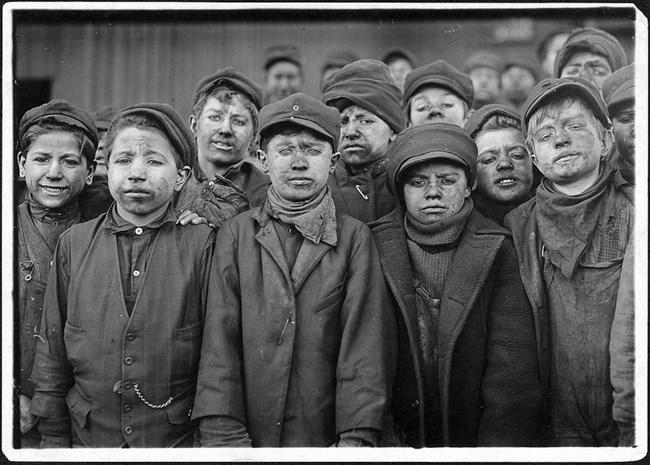Last updated: June 8, 2023
Article
Carl Sandburg Poetry Collection: Child Labor

Library of Congress
In the early 1900s, Carl Sandburg often wrote about his concerns for workers. Among those workers he concerned himself with were the most vulnerable. Child labor was a hotly debated issue at the time. Even adult workers had almost no protections or rights. Sandburg stood against the abuse of child labor and spoke openly on the issue. In a speech, "The Three Great Crimes of Civilization," Sandburg opened with the subject,
"One of the supreme blunders of modern civilization is that practice ordinarily known as child labor. . . hundreds of thousands of children are at work every day in mines, factories and shops ground down into toil."
Carl Sandburg's life, travels, and work shaped his stances on labor and child labor. Sandburg traveled restlessly in his early adulthood. His travels introduced him to people all over the U.S. and their stories, and their children's stories. In his own childhood Carl dropped out of school after the eighth grade to work and help his family. Sandburg's work as a newspaperman also influenced his impression of childcare. His writing and poetry reflected the power of what he saw, below there are selections from Sandburg's Chicago Poems as examples.
They Will Say
Of my city the worst that men will ever say is this:
You took little children away from the sun and the dew,
And the glimmers that played in the grass under the great sky,
And the reckless rain; you put them between walls
To work, broken and smothered, for bread and wages,
To eat dust in their throats and die empty-hearted
For a little handful of pay on a few Saturday nights.
Mill-Doors
You never come back.
I say good-by when I see you going in the doors,
The hopeless open doors that call and wait
And take you then for – how many cents a day?
How many cents for the sleepy eyes and fingers?
I say good-by because I know they tap your wrists,
In the dark, in the silence, day by day
And all the blood of you drop by drop,
And you are old before you are young.
You never come back.
Child of the Romans
The dago shovelman sits by the railroad track
Eating a noon meal of bread and bologna.
A train whirls by, and men and women at tables
Alive with red roses and yellow jonquils,
Eat steaks running with brown gravy,
Strawberries and cream, éclairs and coffee.
The dago shovelman finishes the dry bread and bologna, Washes it down with a dipper from the water-boy,
And goes back to the second half of ten-hour day’s work
Keeping the road-bed so the roses and jonquils
Shake hardly at all in the cut glass vases
Standing slender on the tables in the dining cars.
Anna Imroth
Cross the hands over the breast here – so.
Straighten the leg a little more – so.
And call for the wagon to come and take her home.
Her mother will cry some and so will her sisters and brothers.
But all of the others got down and they are safe and this is the only
One of the factory girls who wasn’t lucky in making the jump
When the fire broke
It is the hand of God and the lack of fire escapes.
According to Paula Steichen, Sandburg's granddaughter, one poem came from his work with Chicago's Daily News. On assignment in the city, Sandburg "learned that seven times as many children died in the Chicago stockyards district as in nearby Hyde Park." He saw the connection between abused and underpaid worker's and the grief of a district. Even when the abused were adult workers, the children still paid an impossible price. He described the suffering caused by the stockyards' working conditions, in his poem, "The Right to Grief."
The Right to Grief
To Certain Poets About to Die
Take your fill of intimate remorse, perfumed sorrow,
Over the dead child of a millionaire,
And the pity of Death refusing any check on the bank
Which the millionaire might order his secretary to scratch off
And get cashed
Very well,
You for your grief and I for mine
Let me have a sorrow my own if I want to
I shall cry over the dead child of a stockyards hunky
His job is sweeping blood off the floor
He gets a dollar seventy cents a day when he works
And it’s many tubs of blood he shoves out with a broom day by day.
Now his three year old daughter
Is in a white coffin that cost him a week’s wages.
Every Saturday night he will pay the undertaker fifty cents till the debt
is wiped out
The hunky and his wife and the kids
Cry over the pinched face almost at peace in the white box
They remember it was scrawny and ran up high doctor bills
They are glad it is gone for the rest of the family now will have more
to eat and wear
Yet before the majesty of Death they cry around the coffin
And wipe their eyes with red bandanas and sob when the priest says,
''God have mercy on us all ''
I have a light to feel my throat choke about this
You take your grief and I mine— see?
Tomorrow there is no funeral and the hunky goes back to his job sweep-
ing blood off the floor at a dollar seventy cents a day
All he does all day long is keep on shoving hog blood ahead of him with
a broom
